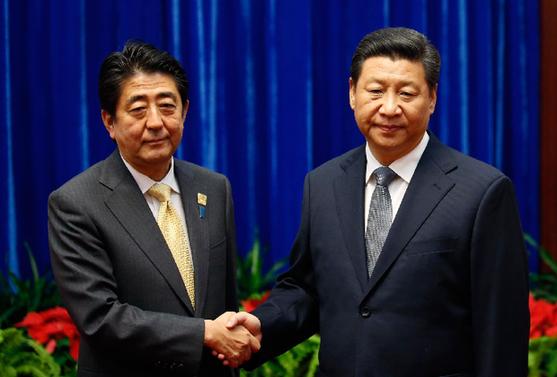President Xi and Premier Abe: a momentous meeting
- By Tim Collard
 0 Comment(s)
0 Comment(s) Print
Print E-mail China.org.cn, November 30, 2014
E-mail China.org.cn, November 30, 2014
|
|
|
Chinese President Xi Jinping and Japanese Prime Minister Shinzo Abe shakes hands on the sidelines of the Asia-Pacific Economic Cooperation (APEC) summit. |
It can be said that the most significant thing about the bilateral summit meeting between Chinese President Xi Jinping and Japanese Prime Minister Shinzo Abe is that it happened at all. Over the last year, China has seemed to regard Abe as beyond the pale of diplomatic intercourse. The growing dissension between the two countries over the Diaoyu Islands and the potential for an actual military clash there has been blamed on Abe's personal influence. His visit to the Yasukuni Shrine, where Japanese war criminals are commemorated, seemed to further underline his unacceptability to China. Earlier this year, it seemed most unlikely that the two leaders would be meeting, shaking hands, and talking about reducing tensions.
But the fact that Beijing hosted the APEC Summit necessitated the presence of the Japanese head of government in the Chinese capital, so China had to choose between increasing bad feelings by snubbing Abe and taking the opportunity to look for ways to improve relations. President Xi, on his own ground and against the magnificent backdrop of Chinese ingenuity which formed the backdrop for the APEC summit, chose to be magnanimous. It was not, of course, possible to resolve all the countries' differences in one meeting, but the agreement to manage rather than exacerbate those differences was certainly a step forward.
APEC is by nature an economic rather than a political forum, thus, economic relations formed the background for this seeming rapprochement. While trade between the two countries has held up fairly well as both are to some extent reliant on the other's products, the level of Japanese direct investment in China has fallen sharply since the downturn in relations began in 2012. Clearly, this is an undesirable development between the world's second- and third-largest economies. The level of business exchange between China and Japan had also plummeted, and President Xi presumably decided it would be a good idea to send a signal that such exchanges were not seen as politically unwelcome.






